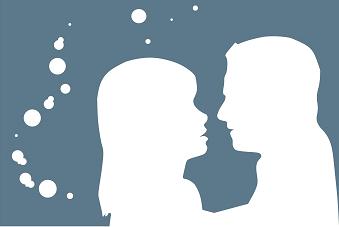

Relationship Addiction
Introduction What’s Codependency How It Happens Characteristics Who’s Affected The Behavior Questions for Yourself Tips for Ending Codependent Relationships Coaching/Consultation Next Month
So here's a cue - if you rescue others and protect them, when they should be suffering their own consequences, if you do everything for other people and little for yourself, if you blame instead of looking at your responsibility in the problem, well you just might be codependent. In the last issue of Powerful Living, the topic was moving on after a break up and I’ve received many e-mails from codependent people who typically suffer from this problem. When you're in a ‘relationship addiction’, moving on can be gut-wrenching – and although you know better you can’t get yourself to move on. The December topic – Relationship Addiction. Codependency - a very common problem.
Around 10 years ago this word was coined to identify an emotional and behavioral problem, affecting a person’s inability to have a healthy, mutually satisfying relationship. They always get attached in a dysfunctional one, and they know it’s bad, but they stay anyway. You can call it a ‘relationship addiction’. How It Happens Anyone can be in codependent. All it takes is being born into a family with these problems: someone in the family has an addiction to food, sex, relationships, gambling, substance abuse etc. There may be physical, emotional or sexual abuse or chronic physical or mental illness. These families know that problems exist but they don’t talk openly. Characteristics Subconsciously, co-dependents play roles: The rescuer. This person saves others from negative consequences eg. calling in sick for the person with a hangover. The Peacemaker. Rationalizes that everything is ‘normal’ – even takes part in the behavior. Superman/woman. Plays the hero to preserve the family image. Takes care of everything. The victim. Becomes a scapegoat and blames others for their misery. The Avoider. Detaches from the family: ‘I don’t care’ Who’s affected Everyone – a spouse, parent, sibling, friend, colleague of a dysfunctional person. The word ‘codependency’ was used to describe partners with substance abuse, or those in a relationship with an addicted person. Today, it’s a term for anyone from a dysfunctional family. The Behavior Codependents have low self esteem so they find it difficult to ‘be themselves’. Some escape through alcohol and drugs. Others use work, gambling, sexual activity, food etc. All their care-giving becomes compulsive and defeating and they often take on the ‘martyr’ role.
Do you accept your own limitations? Do you give too much? Do you fear he/she is cheating? Do you think more about the other person’s problems than about your own? Do you keep checking to catch the person in their bad behavior? Do you worry that if you stop controlling the other person, he/she will fall apart? Do you blame yourself, cover up or ‘rescue’ another? Do you ignore or downplay a real problem that exists
1. Read about co-dependency and get to understand it. 2. Tell yourself that you didn’t cause the problem so you can’t cure it. Stop being a fixer. 3. Don’t rescue another by giving money, lying or getting the person out of trouble. 4. If there is domestic violence in the family, get help. 5. Focus on your own feelings, desires and needs. 6. Allow children to express their feelings. 7. Set your boundaries. Don’t do what you know is wrong or what you feel you should not do. 8. Take action towards a better life for you and your family
Compare a
relationship addiction with a happy one
Recovery Coaching, Personal Coaching and Consultation has been added to Untwist-your-thinking and it’s taken off. If you have any questions about it, here's how it works
Next Month The topic of the first e-zine of 2009 is self-criticism. No one can be a harsher critic than we are on ourselves. If there is one New Year’s resolution you should make, it’s to stop the negative self-judgments - and learn to be your own best friend.
Thanks for all your e-mails, your comments, and suggestions. I love to hear from all of you. I was asked quite a few times to launch a forum on http://www.untwist-your-thinking.com and next year the goal is to do it. This will be a safe, interactive community where you can support others and get advice for yourselves. I'll keep you posted. Wishing you all the best for the holiday season!!
If a friend forwarded this newsletter to you and you like what you read, please subscribe.
|

